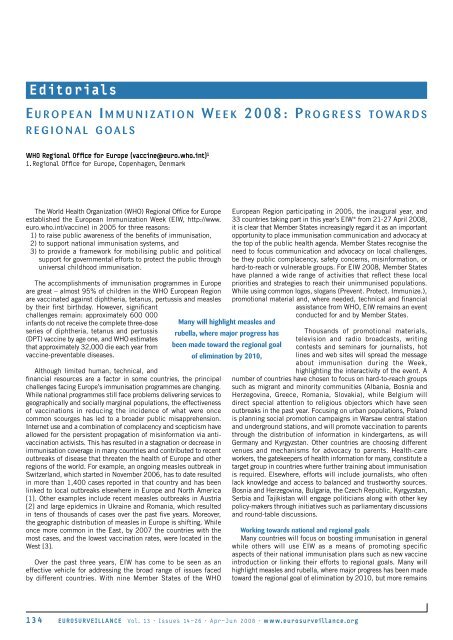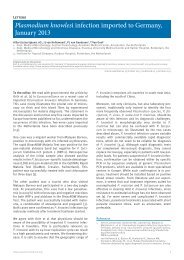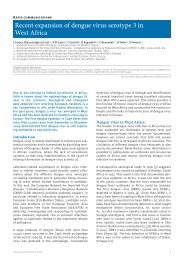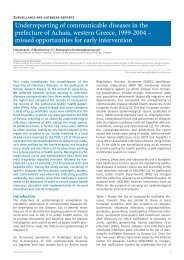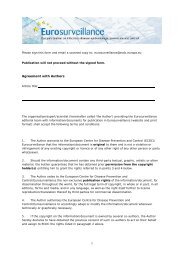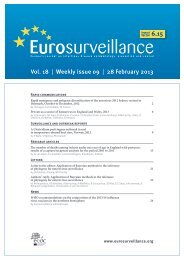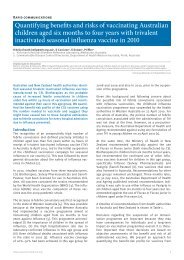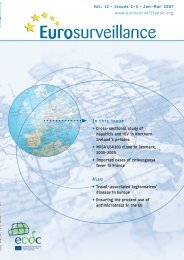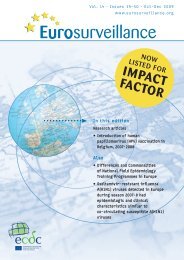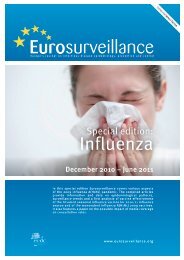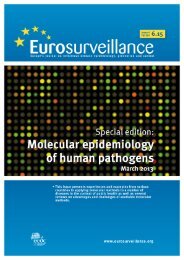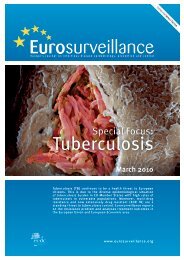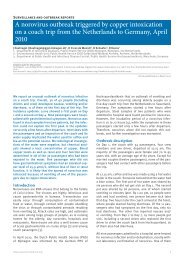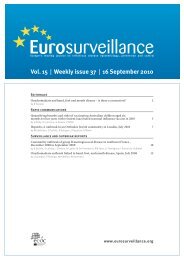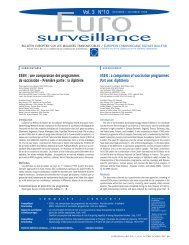In this edition Also - Eurosurveillance
In this edition Also - Eurosurveillance
In this edition Also - Eurosurveillance
Create successful ePaper yourself
Turn your PDF publications into a flip-book with our unique Google optimized e-Paper software.
Editorials<br />
E u r o p E a n Im m u n I z at I o n WE E k 2008: pr o g r E s s t o W a r d s<br />
r E g I o n a l g o a l s<br />
WHO Regional Office for Europe (vaccine@euro.who.int) 1<br />
1. Regional Office for Europe, Copenhagen, Denmark<br />
The World Health Organization (WHO) Regional Office for Europe<br />
established the European Immunization Week (EIW, http://www.<br />
euro.who.int/vaccine) in 2005 for three reasons:<br />
1) to raise public awareness of the benefits of immunisation,<br />
2) to support national immunisation systems, and<br />
3) to provide a framework for mobilising public and political<br />
support for governmental efforts to protect the public through<br />
universal childhood immunisation.<br />
The accomplishments of immunisation programmes in Europe<br />
are great – almost 95% of children in the WHO European Region<br />
are vaccinated against diphtheria, tetanus, pertussis and measles<br />
by their first birthday. However, significant<br />
challenges remain: approximately 600 000<br />
infants do not receive the complete three-dose<br />
series of diphtheria, tetanus and pertussis<br />
(DPT) vaccine by age one, and WHO estimates<br />
that approximately 32,000 die each year from<br />
vaccine-preventable diseases.<br />
Although limited human, technical, and<br />
financial resources are a factor in some countries, the principal<br />
challenges facing Europe’s immunisation programmes are changing.<br />
While national programmes still face problems delivering services to<br />
geographically and socially marginal populations, the effectiveness<br />
of vaccinations in reducing the incidence of what were once<br />
common scourges has led to a broader public misapprehension.<br />
<strong>In</strong>ternet use and a combination of complacency and scepticism have<br />
allowed for the persistent propagation of misinformation via antivaccination<br />
activists. This has resulted in a stagnation or decrease in<br />
immunisation coverage in many countries and contributed to recent<br />
outbreaks of disease that threaten the health of Europe and other<br />
regions of the world. For example, an ongoing measles outbreak in<br />
Switzerland, which started in November 2006, has to date resulted<br />
in more than 1,400 cases reported in that country and has been<br />
linked to local outbreaks elsewhere in Europe and North America<br />
[1]. Other examples include recent measles outbreaks in Austria<br />
[2] and large epidemics in Ukraine and Romania, which resulted<br />
in tens of thousands of cases over the past five years. Moreover,<br />
the geographic distribution of measles in Europe is shifting. While<br />
once more common in the East, by 2007 the countries with the<br />
most cases, and the lowest vaccination rates, were located in the<br />
West [3].<br />
Over the past three years, EIW has come to be seen as an<br />
effective vehicle for addressing the broad range of issues faced<br />
by different countries. With nine Member States of the WHO<br />
Many will highlight measles and<br />
rubella, where major progress has<br />
been made toward the regional goal<br />
of elimination by 2010,<br />
European Region participating in 2005, the inaugural year, and<br />
33 countries taking part in <strong>this</strong> year’s EIW* from 21-27 April 2008,<br />
it is clear that Member States increasingly regard it as an important<br />
opportunity to place immunisation communication and advocacy at<br />
the top of the public health agenda. Member States recognise the<br />
need to focus communication and advocacy on local challenges,<br />
be they public complacency, safety concerns, misinformation, or<br />
hard-to-reach or vulnerable groups. For EIW 2008, Member States<br />
have planned a wide range of activities that reflect these local<br />
priorities and strategies to reach their unimmunised populations.<br />
While using common logos, slogans (Prevent. Protect. Immunize.),<br />
promotional material and, where needed, technical and financial<br />
assistance from WHO, EIW remains an event<br />
conducted for and by Member States.<br />
Thousands of promotional materials,<br />
television and radio broadcasts, writing<br />
contests and seminars for journalists, hot<br />
lines and web sites will spread the message<br />
about immunisation during the Week,<br />
highlighting the interactivity of the event. A<br />
number of countries have chosen to focus on hard-to-reach groups<br />
such as migrant and minority communities (Albania, Bosnia and<br />
Herzegovina, Greece, Romania, Slovakia), while Belgium will<br />
direct special attention to religious objectors which have seen<br />
outbreaks in the past year. Focusing on urban populations, Poland<br />
is planning social promotion campaigns in Warsaw central station<br />
and underground stations, and will promote vaccination to parents<br />
through the distribution of information in kindergartens, as will<br />
Germany and Kyrgyzstan. Other countries are choosing different<br />
venues and mechanisms for advocacy to parents. Health-care<br />
workers, the gatekeepers of health information for many, constitute a<br />
target group in countries where further training about immunisation<br />
is required. Elsewhere, efforts will include journalists, who often<br />
lack knowledge and access to balanced and trustworthy sources.<br />
Bosnia and Herzegovina, Bulgaria, the Czech Republic, Kyrgyzstan,<br />
Serbia and Tajikistan will engage politicians along with other key<br />
policy-makers through initiatives such as parliamentary discussions<br />
and round-table discussions.<br />
Working towards national and regional goals<br />
Many countries will focus on boosting immunisation in general<br />
while others will use EIW as a means of promoting specific<br />
aspects of their national immunisation plans such as new vaccine<br />
introduction or linking their efforts to regional goals. Many will<br />
highlight measles and rubella, where major progress has been made<br />
toward the regional goal of elimination by 2010, but more remains<br />
134 EUROSURVEILLANCE Vol. 13 · Issues 14–26 · Apr–Jun 2008 · www.eurosurveillance.org


